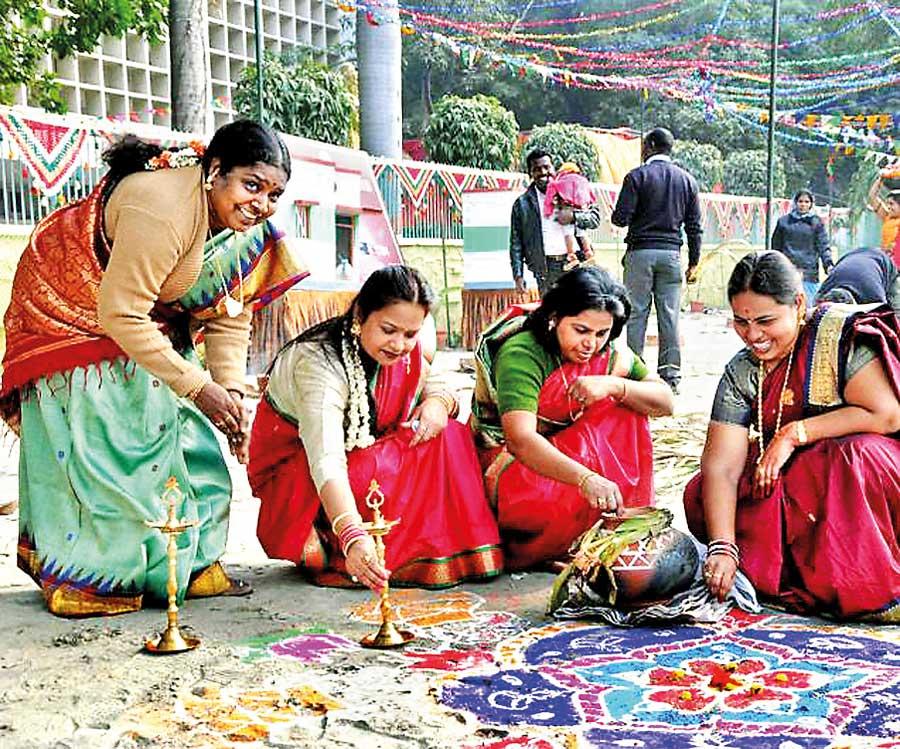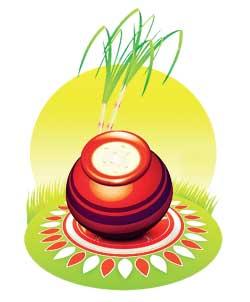Reply To:
Name - Reply Comment

 As the Australian bushfires subside and the Taal Volcano erupts south of Manila in the Philippines, the Tamil-Hindus the world over will be boiling milk and making sweetmeats paying respects to the Sun today.
As the Australian bushfires subside and the Taal Volcano erupts south of Manila in the Philippines, the Tamil-Hindus the world over will be boiling milk and making sweetmeats paying respects to the Sun today.
There won’t be a better day than today for a festival giving importance and honouring the Sun God and by extension Nature, considering the climate challenges humans face today like the Californian bush fires (Though many prove the fires were started by a Directed Energy Weapons) and the Australian bush fires and a disoriented seal visiting the shores of Colombo a few weeks ago.
Enough is said about how and why Thai Pongal is celebrated and the practices revolving around the pastoral agrarian festivities. This Pongal is celebrated on the first day of the month Thai (Pronounced as in ‘why’) in the Tamil Calendar.
Pongal is a series of Tamil/Hindu harvest festivals of the South Indian region, particularly in the Tamil community. It is observed at the start of the month Thai according to Tamil solar calendar, and this is typically about January 14 or 15. This year it ends on January 18.
The wonder is that the sun starts its northward journey today after touching the southernmost point in its southward movement. (Look up suncalc.org) The time is also right to realise unimportance that the humans are just a speck in the cosmic expanse what we understand by common agreement as ‘nature’.
Pongal or Thai Pongal is NOT just a Thanksgiving festival that is unique only to Tamils. It just happens that it is just one of the many hundreds of such festivals throughout the year by numerous cultures AROUND the globe. The Tamil Pongal just happens to be the South Indian or Tamil version.
The celebration of the festival of Pongal dates back to 2,000 years, as early as the early Chola empire. Celebrated on the third day of the Thai month, it is important to most Hindu families in Tamil Nadu as they pray to Sun God Surya and Lord Indra.
Tracing the tradition in history, Surya (Sun) is glorified in the Vedas as an all-seeing god who observes both good and evil actions of humans. He was believed to expel not only darkness but also evil dreams and diseases.
“Sun heroes and sun kings also occupy a central position in Indian mythology, where Vivasvant, the father of Yama, corresponds to the Iranian Vivahvant, the father of Yima. There is a dynasty of sun kings, characteristically peaceful, that is quite distinct from the warlike moon kings,” an encyclopaedic entry says.
“In the medieval Iran, sun festivals were celebrated as a heritage from pre-Islamic times. The Indo-European character of sun worship is also seen in the conception of the solar deity, drawn in his carriage, generally by four white horses, common to many Indo-European peoples, and recurring in Indo-Iranian, Greco-Roman, and Scandinavian mythology,”
Sun heroes and sun kings also occupy a central position in Indian mythology, where Vivasvant, the father of Yama, corresponds to the Iranian Vivahvant, the father of Yima
According to the Puranic literature, Surya Vamsam or the Solar Dynasty or the Ikshvaku Dynasty is an ancient and one of the oldest dynasties of India. The Sun God Surya, also known as Vivasvan is considered the primogenitor of Surya Vamsam and his son Vaivasvata Manu is the progenitor of humanity according to the Hindu texts. Hence Manu Dharma.
 Lord Rama and Prince Siddhartha Gautama (The Buddha) also belong to the Surya Vamsam a or the Ikshvaku Dynasty.
Lord Rama and Prince Siddhartha Gautama (The Buddha) also belong to the Surya Vamsam a or the Ikshvaku Dynasty.
Lineage issues apart, what is important is the natural human interference things.
The Western ignorance of living in harmony with nature starts circa 6 AD and lasted till the Renaissance and later. However, things are changing now. The thought emanates from the human-centric idea -that everything around the man is for him and his survival, instead of the fact that man himself is an inextricable part of the tightly knit ecosystem.
Sometime back a video was circulating in the social media voiced over by Julia Roberts. That video sent a strong message, which unfortunately drowned in the din of worldly events. The video is about the importance of ‘Mother’ Nature. What strikes the message home was its strong ending:
“Nature doesn’t need people; People needs nature” and “I do not need you but you depend on me” That is what is important for us to inculcate in the younger generation. To live in harmony with nature.
That the fact the earth existed-according to high priests of science-4.5 billion years ago; and it will be for billions of years to come. The average life expectancy of a human being is just 79 years as at today. 79 years upon 4,500,000,000. The Sun also has about 5 billion years more. So is earth if the estimate is correct.
However these days routinely I see the empirical science closing in, on the traditional pastoral and tribal wisdom, who lived and live in harmony with nature and thrive. There is no hope for humans; Either adapt to natures ways; Or perish.
But the sad reality is that we have come a long way straying away from those ideals. And the maximum a person can do is to minimise the damage he/she causes to Nature.
Having said that this Thai Pongal day let us remember that Pongal is not just worshipping the sun, but respecting Nature and thanking it as fellow sentient beings.